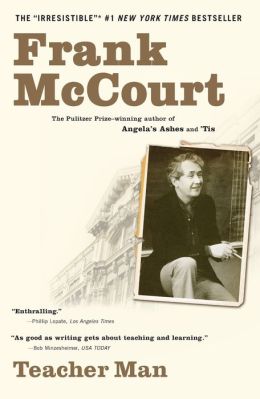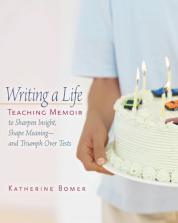Even though I am retired from public school teaching, coaching, and all the other roles I held during my more than 35-year-career, I still consider myself to be a teacher.
As teachers, we come to this profession for many
reasons. We love kids. We love to learn.
We love to help others learn.
We are
devoted to language and words and literature and literacy and thinking.
We compose a variety of types of writing in our communities, in our jobs, and in our personal lives, but in particular we can use writing to reflect on our teaching lives.
Although, Frank
McCourt was probably best known for his memoir, Angela’s Ashes, he also wrote Teacher Man, a memoir about teaching .
In the prologue to this book, he writes about the dichotomy between what we expect when we first step into a classroom and what actually happens.
You think you'll walk into the classroom , stand a moment, wait for silence, watch while they open notebooks and click pens, tell them your name, write on the board, proceed to teach.Instead, of course, there were many moments he recounts of confusion, failure, misunderstanding, and, of course, the moment when the class mouth, as he calls him, raised his hand and called him teacher man.
Memoir or Memory Writing
One difference between memoir writing and autobiography is the distance with which the writer considers her experience -- not necessarily in time-- but in terms of reflection--analyzing and evaluating experiences, looking for patterns, realizing the significance of particular events and relationships, as well as, inner thoughts, insights and growth-- rather than simply a recital of events and dates and people.
In the latter part of 20th century we began to see
bookshelves full of memoir writing
Books that told about whole lives-- from a near-the-end-of-life perspective or at the very least, a truly-lived- lots-of-life perspective.
Now, however, when we say memoir or memory writing, we may, indeed, refer to writing about an entire life, but it is just as likely that we are talking about a smaller slice of life.
In fact, two well-known authors and bloggers, Stacey Shubitz and Ruth Ayres, encourage Slice of Life posts, which have produced amazing memoir writing and personal essays shared by their readers. You may want to check out some of the recent posts for the March Slice of Life Challenge.
So when we talk about memoir writing, we mean memory writing that may refer to
In fact, two well-known authors and bloggers, Stacey Shubitz and Ruth Ayres, encourage Slice of Life posts, which have produced amazing memoir writing and personal essays shared by their readers. You may want to check out some of the recent posts for the March Slice of Life Challenge.
So when we talk about memoir writing, we mean memory writing that may refer to
- a certain time or period
- a specific relationship
- a particular theme noticed or discovered
We are concerned with honest retrospective reflection. This kind of writing is an opportunity for a second reading of experiences--a looking back with 20/20 hindsight.
We all have stories to tell, experiences on which we can look back and reread our lives.
We all have lives to celebrate.
In his book for young people, How to Write Your Life, Ralph Fletcher debunks several lies that may keep us from writing about our lives.
His list of lies that may stop us from writing, whether
we are young or old, include:
Two additional books that I have found to be essential in teaching memoir or memory writing and in writing my own personal stories include Writing a Life: Teaching Memoir to Sharpen Insight, Shape Meaning--and Triumph Over Tests by Katherine Bomer and Old Friend from Far Away: The Practice of Writing Memoir by Natalie Goldberg.
We all have stories to tell, experiences on which we can look back and reread our lives.
We all have lives to celebrate.
In his book for young people, How to Write Your Life, Ralph Fletcher debunks several lies that may keep us from writing about our lives.
His list of lies that may stop us from writing, whether
- You have to be a famous celebrity.
- You must have an amazing life.
- You can't write your life story until you're old and gray.
- Nobody will read it, so what's the point?
Click here to read additional tips from Ralph Fletcher that may help you and your students write about your lives or follow his blog posts.
Two additional books that I have found to be essential in teaching memoir or memory writing and in writing my own personal stories include Writing a Life: Teaching Memoir to Sharpen Insight, Shape Meaning--and Triumph Over Tests by Katherine Bomer and Old Friend from Far Away: The Practice of Writing Memoir by Natalie Goldberg.
Today's Deeper Writing Possibilities
Consider events, relationships, situations and other elements of your teaching or personal life.
As you brainstorm and remember, you may want to make a web or list these important memories.
As you consider one item from your list or web, look for patterns, symbolism, themes and or particular significances.
Write about your memory.
What did your learn about yourself? about others?



No comments:
Post a Comment